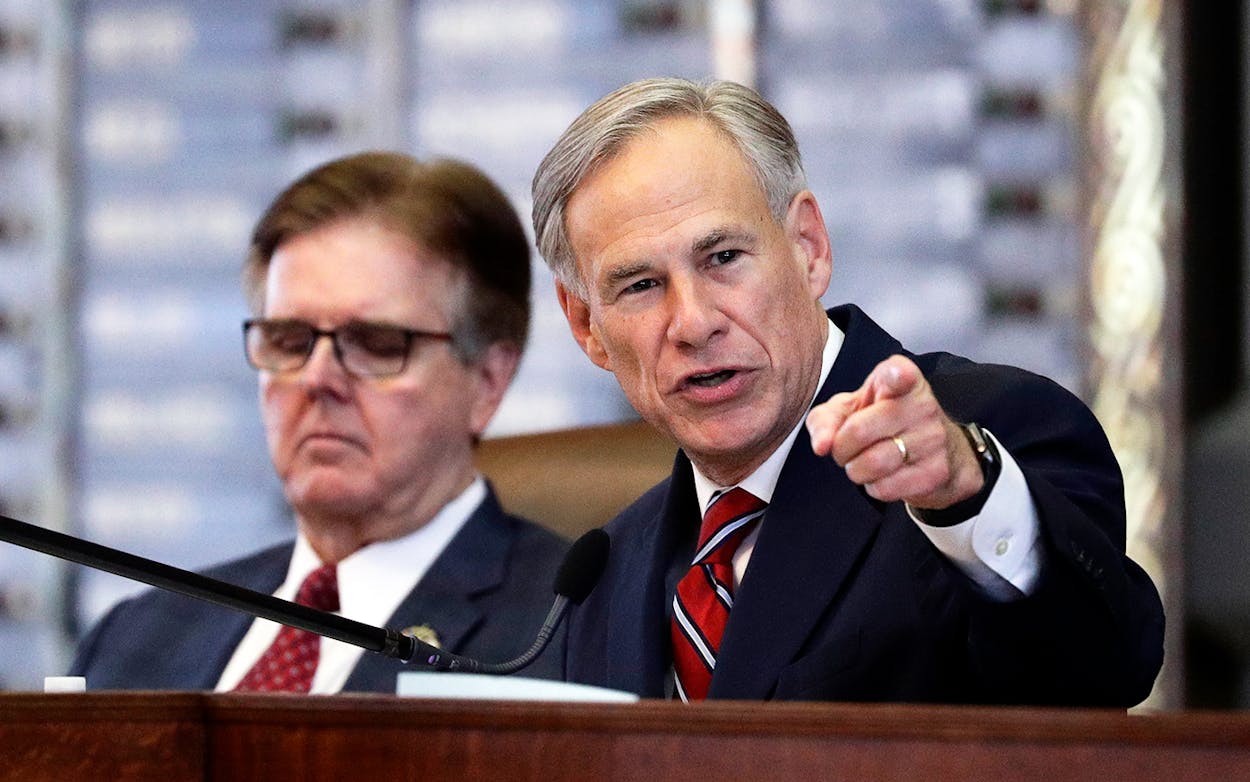A week after federal prosecutors charged dozens of people in a massive college admissions bribery scheme, Governor Greg Abbott sent a letter to all Texas regents on public university boards on Monday directing them to investigate their own admissions policies.
“The Legislature has assigned important responsibilities to the governing boards of Texas’ institutions of higher education, including setting campus admissions standards,” Abbott wrote in the letter. “Every board must therefore closely examine and investigate its admissions policies and procedures to ensure that no university employee engages in fraudulent schemes, quid pro quo arrangements, or improprieties of any sort. Our universities—first and foremost—exist to serve qualifying students who graduate Texas high schools. Those students, their parents and taxpayers must have confidence that the system is not rigged.”
The U.S. Department of Justice charged a total of 44 people last week with crimes ranging from racketeering to mail fraud, money laundering, and obstruction of justice, part of an alleged conspiracy that “facilitated cheating on college entrance exams and the admission of students to elite universities as purported athletic recruits,” according to the DOJ. Those charged included Hollywood actors, wealthy business owners, prominent lawyers, and several Texans. The University of Texas at Austin was one of several elite universities across the country implicated in the scandal.
“For every student admitted through fraud, an honest, genuinely talented student was rejected,” U.S. Attorney Andrew Lelling said during a press conference in Massachusetts on March 12. “The parents charged today, despite already being able to give their children every legitimate advantage in the college admissions game, instead chose to corrupt and illegally manipulate the system for their benefit. We’re not talking about donating a building so a school is more likely to take your son and daughter. We’re talking about deception and fraud. Fake test scores, fake athletic credentials, fake photographs, bribes to college officials.”
Lelling added that this is the largest college admissions scam ever prosecuted by the Department of Justice, that the investigation is ongoing, and that others may still be charged.
There are four people currently facing federal charges in Texas: Michael Center, the former head coach of the men’s tennis team at the University of Texas at Austin, who was charged with mail fraud and is accused of accepting bribes; Niki Williams, a college entrance exam administrator employed by the Houston Independent School District, who was charged with conspiracy to commit racketeering and is alleged to have accepted bribes in return for helping to falsify entrance exam scores; Martin Fox, a Houston resident and the president of a private tennis academy in Houston, who faces charges of conspiracy to commit racketeering and allegedly received hundreds of thousands of dollars for his help arranging bribe payments between parents of prospective students and college coaches; and John Wilson, a CEO of a Massachusetts private-equity and real estate and development firm, who faces charges of mail fraud and allegedly tried to bribe coaches at USC, Harvard, and Stanford to help his son and two daughters get accepted as recruited athletes. (It’s unclear why Wilson has been charged in Texas.)
Center was fired by UT the day after he was indicted by federal prosecutors, who say he allegedly accepted $100,000 in return for helping to admit a child of wealthy parents as a recruited tennis player, even though the prospective student had not played competitive tennis since he was a high school freshman. UT president Gregory Fenves said that the university is conducting a “thorough review” of the allegations against Center and will investigate “whether the university has the necessary rules and procedures in place to prevent violations in the future.”
“The integrity of UT admissions is essential to our mission as a research university and to the students and families we serve,” Fenves said last week in a written statement. “That is why any act of wrongdoing, no matter how singular, matters so deeply. At UT, tens of thousands of students, faculty and staff members, coaches and admissions officers conduct themselves with honor and distinction every day. Any ethical breach overshadows their accomplishments and violates our culture of service and distinction. Moving forward, we must continue to strive for the highest ethical standards at The University of Texas.”
UT is also investigating hundreds of thousands of dollars in “gifts” from a shady nonprofit that was allegedly used to launder bribe money going from rich parents to coaches and university officials (Center was the only UT employee implicated in the indictments; the alleged bribery scheme encompassed many elite universities across the country). Key Worldwide Foundation, a federal tax-exempt organization that federal prosecutors say was used as a front to facilitate the alleged bribery scheme, claimed on its Form 990 (a U.S. Internal Revenue Service document that provides the public with financial information about nonprofits) that it had “donated” $294,000 to “University of Texas Athletics” in 2015, followed by $252,000 in 2016. Last week, a UT spokesperson told Texas Monthly that the university has no records matching the large donation amounts described in KWF’s tax forms and is “in the process of reviewing other gifts that could be related to the 2015 incident, which could total several hundred thousand dollars.”
- More About:
- Scandal
- Greg Abbott
- Austin






